by Jenny Rose | Aug 26, 2023 | A Flourishing Woman, The Journey
Two weeks ago my 87-year-old demented mother fell in her memory care unit and broke a hip for the second time in less than a year. Eight days later she died in a hospital under the care of Hospice, my brother at her side.
Until I sat down to write this, I was afraid I had lost my words, lost the need to write them, lost the ability to form them into meaning. But I haven’t. I’m still a writer. This remains. That’s a relief.
Oh, I’ve been writing. Lists. Notes. An obituary. Texts. Updates to family and friends. Daily journaling. But it hasn’t been creative writing. It hasn’t been this blog, or my fiction. These last two weeks have passed by, the first in a blur of pity and anguish, and the second in numb relief glazed with exhaustion, and I have not posted or published. I haven’t kept track of the days; they spill into one another, as the days and nights blended together while my mother lay dying and we waited.
For a time words have simply been inadequate to relieve the pressure of my feelings in any organized or coherent way. They flew away from me, leaving a series of kaleidoscopic impressions, sensual details so vivid they frightened me with their power.
While my mother lay dying I reread my childhood copy of The Wind in the Willows by Kenneth Graham. Reading has also largely failed to sustain me during this time. I find myself unable to focus. I read a paragraph or two, and then realize I’ve been sitting staring into space, out the window or into the garden, not hearing, not seeing, not even thinking. Just sitting. But I needed a companion for the night watches, something comforting and familiar. Something innocent.
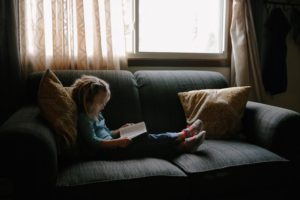
Photo by Josh Applegate on Unsplash
The fan in my window purred during those hours, blowing in cool night air and an occasional moth or mosquito. Every night, when I go to bed, I light a tea light in a candle lantern. When calls or texts reached me, I knew when I opened my eyes if it was before midnight or after, according to whether the candle still burned. Propped up on pillows, glasses on, my small bedside lamp alight, I spoke to Mom’s facility staff, emergency department doctors and nurses. I texted with my family. I read, the well-remembered illustrations making me smile as I communed with Rat, Mole, Badger, and the ridiculous Toad, finding respite for a few minutes before turning off the light and lying awake in the dark room, listening to the fan, feeling my heart beat, resting, breathing, waiting.
While my mother lay dying and after, I’ve stained wooden pallets. My partner and I are building a 3-bin compost system against the back yard fence. We set out sawhorses. I found an old brush, a rag, a stirring stick. We bought stain. I lay a pallet on the sawhorses, brush away dirt and debris, and paint every surface. The raw wood soaks in the oil-based stain, a rich brown color. The brush is more and more frazzled. I’m sloppier than I would be if painting a wall. The pallets are splintery. Some of the boards are split or loose. I bend over, the sun hot on the back of my neck and my bare arms. Mosquitos bite me. Stain drips between the boards as I brush their edges, dappling the sawhorses, falling onto the filthy old cream-colored jeans I’ve been wearing all summer in the garden, and onto my worn-out sneakers, used only for outdoor work now. As I maneuver between the boards, stain smears the skin of my hands and wrists. I kept the phone close, in a patch of shade.
This is the only sustained work I’ve been able to do. Now and then I wash a few dishes. I’ve done a couple loads of laundry. I go out into the garden, note the trimming, pruning, composting, mowing waiting to be done, and turn away. It all feels like too much. I don’t know where to start. It’s impossible to open the garden shed, get the tools, wheel out the wheelbarrow.
But the pallets. I can do that. It’s a simple task, direct. I don’t need to make any choices. Each side takes fifteen or twenty minutes. When I’ve finished a side, I wrap the brush in an old plastic bag, cover the can loosely, let the pallet dry an hour and a half in the sun. Then I turn it over and begin again. Two coats each side. One side after another.

Photo by Manuel Barroso Parejo on Unsplash
The smell of stain. The prickly feeling of intense sun on my skin. I think about compost, recycling, breaking down life to sustain new life. I think of ashes to ashes and dust to dust. I wonder if I’ll ever use the compost bins without thinking of Mom. I wonder who names the colors of stain and paint. I chose ‘Canyon Brown’ for this project. I vaguely hear birds, cars passing by. Small groups of women walk by in clumps, hospital employees on their lunch break, talking about families, gardens, school starting, hospital gossip. I should be at work, on that same campus, just a ten-minute walk away. I should be, but I’m not. I’m here, staining pallets, waiting for Mom to die and then on bereavement leave.
Am I bereaved? How would I know? I wonder why I don’t care enough to follow the thought. I let it drift away.
I decide I want to make bread. I don’t eat bread often, so rarely make it any more. But my rosemary is bushy and ready to be harvested, and someone brought fresh home-grown garlic into work to share before … before all this. So I make a sponge, stirring together milk, a little sugar, yeast, water. I chop fresh rosemary and garlic, very fine. I take flour out of the freezer and let it warm. The dough is heavy under my hands, sticky at first and gradually becoming supple and smooth. The earthy smells of garlic and rosemary vanquish the smell of stain in my nostrils. I turn the dough, kneading. The timer ticks off seconds and minutes. I clean the bowl, grease it, use a linen towel to cover it for rising. I put it in the oven for safe keeping, because the cats are likely to lie on it or step in it, or nibble at it if I leave it out. The bread, like the pallets, is a project in stages. I don’t have to focus on any one step for more than a few minutes. I move between the kitchen and the back yard with my phone, not thinking, not planning, just taking the next step, and the next. I can’t remember times, so I write them down. About 90 minutes for the stain to dry. An hour for the bread to rise. Another 90 minutes for the pallet to dry. Another hour for the shaped loaves to rise. Another 90 minutes. An hour for baking.
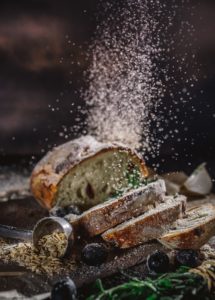
Photo by Helena Yankovska on Unsplash
At the end of the day, I have two enormous round loaves of bread to cool, slice, and put in the freezer. This batch will last me for a year. I have finished another pallet. I leave it on the sawhorses to dry overnight. My stained hands smell like garlic.
I haven’t cried since the last night call, my brother telling me Mom was gone. Perhaps I cried all my tears before she went. I receive condolences with all the grace I can muster. People talk to me about God and heaven. They talk to me about Mom. They talk to me about their own experiences of death. I try to be gracious. I try to look like I’m listening, like I’m there. With my brother and sons, my partner, I can be real. The faces of my friends comfort me. They don’t need anything from me. They don’t ask for anything. I can see their concern, their love for me, their sorrow. They hug me, and smile. They talk to me about small things, the daily things I’ve lost track of – family, friends, outings, work. I pick up a friend’s daughter and feel almost normal, doing an ordinary thing, a manageable task I cannot fail.
I realize part of my feeling of unreality is rooted in a loss of identity. I catch sight of myself in the bathroom mirror and pause. I rarely look at myself in the mirror. This woman, who is she? She isn’t the disappointing daughter any more. She can’t be, if there’s no mother to disappoint. What else is she? Who else is she? I look into my own eyes and feel no shame, no guilt. Did Mom take them with her? How will I navigate my life without them on my shoulders, without the knowledge that Mom is alone, suffering, needing? For fifty years I was at her side, day and night, year after year, ineffectual, helpless to fix or heal her physical pain, her dysfunction. Feeling my failure, my powerlessness, knowing I more often made it worse than better as time went on, even though she clung closer and closer to me as she aged. She could not release me and I almost waited too long to release myself.
But the geographical distance I put between us brought no real release. She still suffered. She declined, grew confused. Her body aged and began to run down. She was just as lonely without me as she was with me, just as emotionally remote, just as relentlessly needy. She cut herself off from me, but I still carried her. Internally, I still orbited around her. I still agonized for her.
I still loved her. I always loved her. I accepted she could not find me lovable, but it made no difference. She was my mother, and I loved her. All I ever wanted was for her to be well, and happy, but I could not make it so, and in her eyes it was my responsibility to fill her need. Indeed, she told me long ago her physical pain started with her pregnancy with me. I accepted the blame, and was heartbroken, and have tried desperately to make up for it ever since.

Photo by Nicole Mason on Unsplash
Now Death has come to stop her suffering. Has mine stopped, too? I don’t know. I’m too numb to tell. But I feel different. I feel … released. I prayed for her release and freedom, not mine, but perhaps they were linked. Many times a day I think of her, hear her voice in my head, and I realize with a painful clench of my heart she’s gone. It’s over. I can’t humiliate her anymore because of what I wear, how my hair looks, what I do, who I sleep with, or, most of all, what I write. She’s moved beyond humiliation. I can’t fail her anymore. And that’s a soaring, joyful, unbelievable thought. I can’t fail her anymore.
I wonder if I’ll finally feel good enough, if I’ll do a good enough job, live a good enough life. Might I simply enjoy my small talents, my joyful work, my community, my garden? Might I immerse myself in the loveliness of life without the gnawing guilt of knowing I’m happy when she’s not, I’m companioned when she’s not, I’m relaxed and rested and peaceful when she’s not, I’m laughing when she’s not?
The last couple of times I spoke to Mom, I told her it was okay to rest now, she could let go, be at peace. We told her her loved ones and animals were well and happy, and she could relax.
I told her, and I meant it. Was I telling myself, too?
She could not release me, yet I am released. Did Death break the chains when he gathered her in? Or now, at last, have I released myself, now that she’s moved entirely out of my power and knowledge?
As I write this, it’s Wednesday afternoon. I have finished another pallet. I have written. I have sat in the sun, read a paragraph or two at a time of an old Edna Ferber novel, rested my eyes on the garden. The lily stems are turning dry and brown, as are the leaves. Sunflowers bloom. The sun is hot. The phone has been sitting on my kitchen table all morning, silent, as I go in and out. I have balanced my checking account, scheduled a private swim lesson in a home pool, ironed a tablecloth and three napkins. Tomorrow I go back to work.
A new page of my life has turned. I can’t read it yet. It’s enough to sit with it in my lap, letting my gaze wander over blue sky and afternoon clouds, the garden, our old cars, the worn wooden boards of the porch, the bruise on my left knee, the mosquito bites on my right arm, the smears of stain on my hands. It’s too bright in the sun to read this new page, too hot, too much effort. I’ll read it later.
I dare to be at peace.
Daughter’s Dream (July 2014)
I dreamt I carried my mother.
The car had slipped out of her control
with a blind will of its own,
and I thought
I knew she shouldn’t be driving.
We landed in water.
I swam to her and held her in my arms.
Then the water was gone.
I carried my mother,
but she left my embrace,
slipping free of her embattled flesh.
Irrevocably, I felt her go.
I was alone.
I carried the vacant body of my mother.
Empty beds stood all around me
but the sheets were disordered and dank,
Smeared with shit.
I carried the vacant body of my mother.
There was no clean place to lay her down.
I carried the vacant body of my mother,
seeking to slip into my own freedom,
seeking absolution.
To read my fiction, serially published free every week, go here: 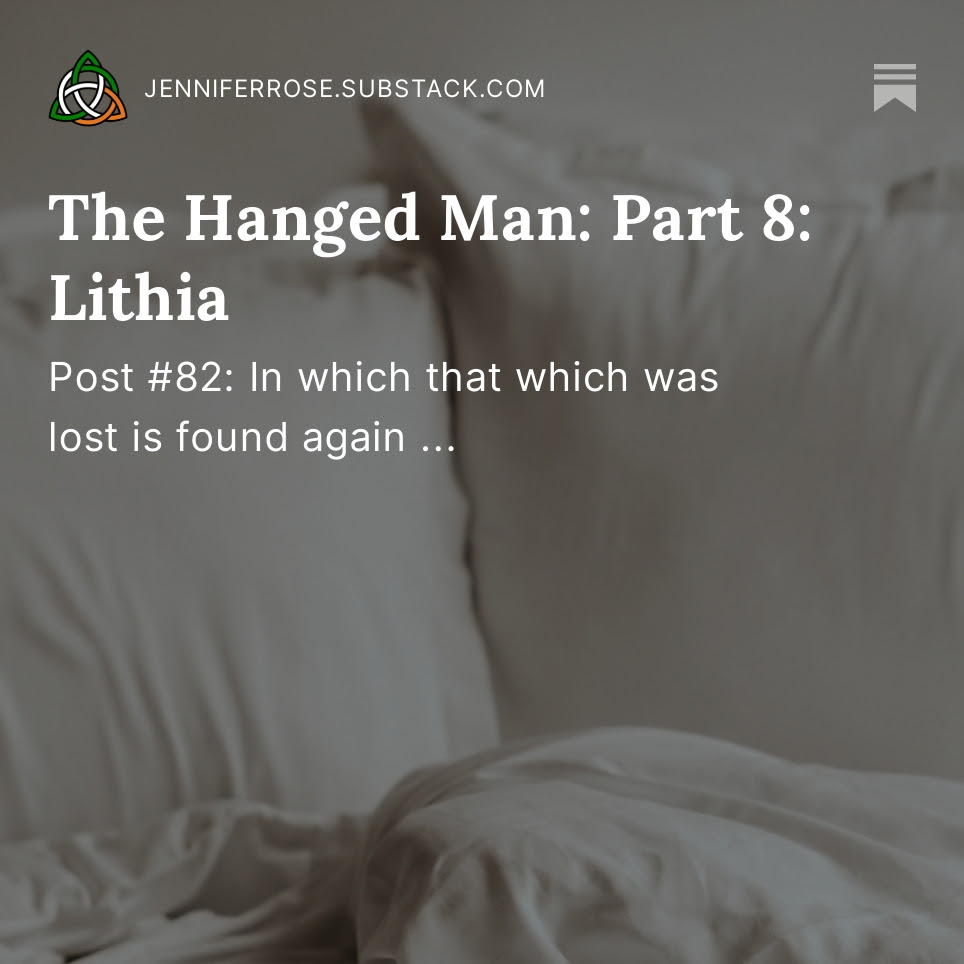
by Jenny Rose | Aug 5, 2023 | Power
Last week a Substacker I follow, Candace Rose Rardon, illustrated a memory I shared with her. I was absolutely thrilled. The union of my words and her art spoke to one of my core values: collaboration.
Collaboration is about power management. It’s defined as working with someone. Not directing them. Not submitting to them. Working with them. In other words, sharing power – power-with rather than power-over.
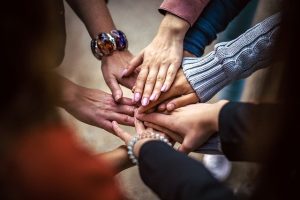
Image by Bob Dmyt from Pixabay
Is it just me, or are we as a culture moving away from sharing power rather than toward it?
Collaboration and cooperation lie at the heart of my fiction. All my life I’ve been preoccupied with working together, but I never had adequate language or studied power until I learned emotional intelligence. At that point the light dawned. I reviewed my relationships, both family and otherwise, through the lens of power.
It was a grim review. I set out to reclaim my power.
Let’s be clear: reclamation is not stealing.
I didn’t want to take power away from others. I wanted to reclaim what had been taken from me.
This involved needs, boundary work, and many other moving parts, most of which I’ve written about here over the last seven years (almost exactly seven years … wow), and all of which are woven into my books.
Speaking of my books, I have a dream that one day a visual artist will read my work, become inspired, and want to illustrate it. That’s not all. (Might as well dream big, right?) In the same dream a musician (drums and flute or pipe, at least) reads my work, becomes inspired, and adds music and a soundscape to it. I even dream one day we’ll develop the ability to incorporate scent into reading. 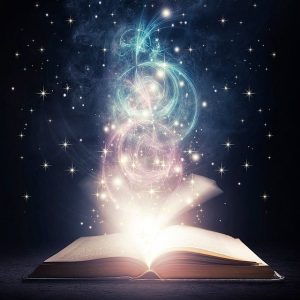
I am a sensual person, and my writing reflects that. I myself see my characters and my world of Webbd vividly, but I’m not an artist. I respond deeply to music physically and emotionally, but I’m not a musician.
In every relationship I’ve sought collaboration. I’ve wanted a safe place to have an authentic voice, express an opinion, make a contribution. I’ve wanted the power to make choices. This has been true in the context of family, friends, spouses and boyfriends, coworkers, and community.
I have not been noticeably successful until the last ten years.
No matter how talented, strong, or knowledgeable we are, healthy collaboration can only make us bigger. Collaboration is tricky, though. It’s messy. We’re forced to deal with conflict, with different visions and voices than our own, different backgrounds, different belief systems, different ways of looking at the world and interacting with life. It’s work. It stretches us uncomfortably. We might have to be wrong (gasp!) and someone might find out we were wrong (horrors!).
Plenty of people say they want to collaborate when their true intention is a hostile takeover. Others seek collaboration as a way to make money or leverage other aspects of social power. Their agenda is to accrue power, not share it.
What Candace Rose Rardon did was extend a gift of generosity. When I sent her my memory I had no power over whether she chose to illustrate it or how she would illustrate it. I handed her my words and went on with life. I had no expectations. She sent back something beautiful woven of my words and her art. I’ve never met her. We exchanged no money. I know very little about her, but I do know this: she’s part of my tribe. She’s a creative collaborator.
Collaboration requires a willingness to be flexible and the willingness to accept someone’s vision regarding our art. As creators, we need to loosen our grip on our masterpieces and allow others to widen us. Perhaps someone else visualizes our character slightly differently than we do. Perhaps they see the character more clearly, or more fully than we can. As collaborators, we may be pushed to do more than we’ve done before, take new risks, try new things. Healthy collaboration makes us all more powerful, more expansive, more interesting, more textured.
We are stronger and more beautiful together than we are apart.

Photo by Helena Lopes on Unsplash
Collaboration is everywhere. It’s the falling rain and early birdsong on a spring morning. It’s the calling of shorebirds against the background of surf. It’s the buzzing of a fat bumblebee in a fragrant blossom. The world is unbelievably sensual. Walking through tall grass this time of year, the stems and heads turning straw-colored, the small scratching prick of grasshopper legs on my bare skin, the scent of warm grass in my nostrils, is a miracle of collaboration. A garden exists because of collaboration between countless forms of life and the weather.
We can’t collaborate in every situation all the time. Leaders lead. Parents parent. Bosses must manage their people, teachers their students. We all have areas in our lives we like to manage solo, including areas in our creative lives. On the other hand, we are seeing the consequences of no collaboration: chaos, fear, hatred, division, destruction, and social breakdown. We are now successfully being manipulated into choosing not to collaborate even with ourselves, but with consumerism, capitalism, and ideology instead.
Collaboration is wide. It’s not only about human-to-human interaction. If we don’t figure out how to collaborate with our planet, with the human and non-human life around us, and (perhaps most importantly) with ourselves, we will not thrive. We’ll solve no problems. Nothing will change. We’ll meet challenges as individuals and as communities and countries poorly. We will keep ourselves small, disorganized, and weak.
Or we can choose to combine our knowledge, our skills, our vision, and our humanity.
Questions:
- How have you collaborated successfully with others?
- How have you struggled with collaboration?
- What’s the hardest thing for you about sharing power with another?
- Are you open to collaboration? Why or why not?
Leave a comment below!
To read my fiction, serially published free every week, go here: 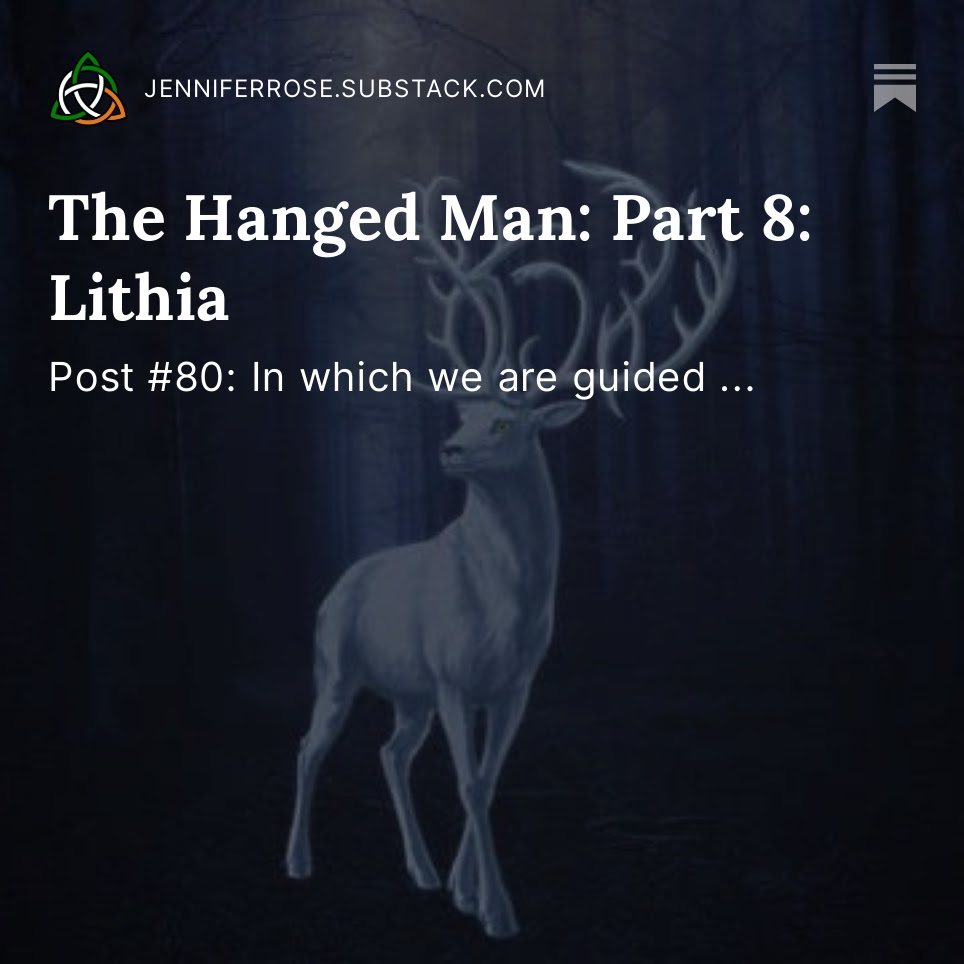
by Jenny Rose | Jun 10, 2023 | Connection & Community
I’m living inside this poem right now:
Ozymandias
I met a traveller from an antique land
Who said: “Two vast and trunkless legs of stone
Stand in the desert … Near them, on the sand,
Half sunk, a shattered visage lies, whose frown,
And wrinkled lip, and sneer of cold command,
Tell that its sculptor well those passions read
Which yet survive, stamped on these lifeless things,
The hand that mocked them, and the heart that fed:
And on the pedestal these words appear:
‘My name is Ozymandias, king of kings:
Look on my works, ye Mighty, and despair!’
Nothing beside remains. Round the decay
Of that colossal wreck, boundless and bare
The lone and level sands stretch far away.”
–Percy Bysshe Shelley
I want to escape this haunted place, walk away, never look back, forget, and wander among green trees, feeling their breath on my face. I want the blessing of the rain on my skin, to plunge my hands into rich soil, lie open to birdsong and the sun’s touch.
I want to be free.
Yet, again and again, I find myself crouching in front of that shattered visage, tracing the frown, the wrinkled lip, the sneer of cold command, unable to leave it or look away. I remember, and weep, and try to understand how something so mighty, so powerful, can fall and break apart, become nothing more than a colossal wreck in a desert in an antique land, unvisited, unremarked, nothing but time’s debris.
I was born in the shadow of those stone legs. I watched the sculptors at work, perfecting, shaping. I learned to worship Ozymandias, to make myself small before him, to endure his stony displeasure and indifference.
I did not know his name for a long time, not until I read this poem in high school. He was called Money. He was called Status. He was called Power. He was king of kings – that I never doubted. He required unceasing sacrifice; though I sacrificed everything I had, the sneer and wrinkled lip looked down upon me in infinite contempt. I looked upon his works and saw destruction and anguish. I saw lies and shattered lives and I despaired.

By Wei Gao on Unsplash
I left. I crawled away under the weight of my own inadequacy and unworthiness, across the lone and level sands, feeling his stone gaze upon me. I left, and one day I got to my feet and walked, and then I remembered how to dance, and swim, and the world opened up for me, showing me friendship, healing and joy.
Then, across the years, across the miles, Ozymandias fell, and the ground of my being has shuddered and convulsed with the impact ever since.
Understand, when he fell it all fell. Secrets lay revealed. Lies tumbled naked in the desert sun. Ozymandias, so carefully sculpted by generations before me, disintegrated. I understood then what I was taught to call Money was really named Fear. Status was in fact Shame. The wrinkled lip and sneer of cold command were not love, were never love. The king of kings lay forgotten, impotent, slowly wearing away to sand.
“Look on my works … and despair.”
It’s all gone, the gods of my childhood, the king of kings, the money, the status, the false power.
All gone.
Except for me. I am not gone.
In Maine, I eat and sleep. I journal and write. I walk to work, talk to people, laugh, teach. I sweat on the elliptical and exercise in the pools. I pay bills, make plans, file papers. I buy groceries and cat food. I do laundry and clean. I work in the garden. I’m distracted and absentminded, prone to sleeplessness and unexpected fits of tears welling from some deep unaware place. Or, on the other hand, maybe that place is all I’m truly aware of right now.
I talk and text and email to staff at the memory care center in Colorado where my mother resides, to her hospice team, to people at the agency we’ve now hired by request to provide extra caregiving. I hear about dementia, combative behavior, falls, sabotaged bed alarms, incontinence, sleeplessness, anxiety, medication adjustment. I am called to calm Mom down as though that was ever possible, as though she trusts me or ever took any comfort from me.
And part of me kneels in the desert, watching the family money (a mere pittance, judged by today’s standards rather than those of 100 years ago) and pride, that towering edifice more important than love, more important than health and happiness, more important than anything, sink into the desert like water. Is the desert powerful enough to cleanse it? Shattered Ozymandias still frowns, wrinkles his lip, sneers his cold command, but his works have disappeared even as he himself wears away.
Do I grieve or rejoice? I try to understand. I try to feel something more than despair at the waste of lives, at the dearth of love.
One thing I know: I will not stay here, beside Ozymandias. It’s a cursed place, a dark place. I will leave it to the circling vultures, the sun, the wind, and the silence. I will leave it to Time to wear away the sneer, the frown, the wrinkled lip, the trunkless legs. I left once, and I will leave again. I know this desert is a small place and the world is wide. I know who I am now. I know what love is, and that I’m capable of it. I am no longer alone.
I would have saved my family if I could have, but my gifts have no monetary value. What I have to give, what I am, cannot be bought or sold. I do not accrue a good rate of interest. I was not judged a sound investment. I did not increase my family’s status. Ozymandias, king of kings, was incapable of seeing or knowing me, being far too dazzled with his mighty works, dissolving now into sand while I myself, still vital and alive, pause to find absolution and mourn, groping for a way forward, watching it all decay.
Questions:
- What idols have fallen in your life?
- What family secrets have you discovered?
- Do you find comfort in the eventual fall of what once seemed all-powerful, or does it frighten you?
- How have you challenged your family’s definition and expectations of you?
Leave a comment below!
To read my fiction, serially published free every week, go here: 
by Jenny Rose | May 27, 2023 | Connection & Community
My partner tells me I “build bridges.” He’s right. I do. All the time. Building connection is the foundation of my life – connection with myself and with others. I also do what I can to support connection between others.
It’s no wonder I feel increasingly alienated in a culture focused so strongly on division.

Image by Bob Dmyt from Pixabay
Some people, and right now many people in power, are breakers rather than builders. I won’t pretend I understand such a priority, but it’s undeniably real and undeniably destructive.
As I’ve thought about building bridges, I’ve realized underneath the patterns of building or breaking is a larger issue: power.
If evil exists, I believe one of the first steps on the road to it is the willingness to steal power by any and all means. When individuals and groups of people lose their power, they’re easy to break, easy to disconnect and isolate. Easy to control.
Dedicated power-stealers are very, very skilled at what they do, so skilled they often present themselves as the marginalized or disempowered victims. In this guise, they infiltrate systems, organizations, and groups like a cancer, steadily breaking healthy connections and communities and appropriating power. By the time enough people notice, clearly identify what’s happening, and organize resistance, the balance of power is so skewed serious conflict becomes inevitable. Those addicted to stealing and hoarding power don’t give it up without a fight. This classic aggressor behavior is referred to as DARVO: Deny, Attack, Reverse Victim and Offender. In this dynamic, when individuals and groups are forced to defend themselves from aggressors their defense is framed as bigotry and hatred. Brutal social sanctions steered by those who steal power are activated to stifle it.
Few see past the emotional rubble and wreckage of destruction to the offense triggering the defense, and even fewer see past all the drama and distraction and recognize a simple, savage power grab disguised as social justice, political correctness, compassion, empathy, etc.
This is not to negate the true problems of systemic and institutionalized racism and bigotry so many people stagger under every day. We all know power (and other resources) are not distributed equally – far from it. And why is that? Because there have always been people who are committed to disempowering others.

Photo by Tim Gouw on Unsplash
I’m a builder, not a breaker. Not a breaker, I hasten to say, in the sense that I deliberately hurt others or injure healthy connection. However, I have more than once tried to build a bridge to nowhere. Worse, I have spent much of my life frantically maintaining my bridges to nowhere, a kind of counter-terrorist who never blows up a bridge but instead batters myself against a broken one as though my blood, sweat, and tears will magically build a solid, effective connection.
The thing I invariably forget is not everyone wants to build a bridge!
Sometimes, and I’ve done this, we blow up bridges accidentally. Some action or word becomes a catalyst and suddenly … BOOM! The bridge is destroyed and we’re left wondering what the hell happened.
Sometimes our bridges are sabotaged by others and deliberately destroyed. Unless both parties connected by the bridge understand what’s happened and work together to make repairs, the bridge becomes permanently weakened.
Sometimes, and I’ve made this choice, too, we deliberately walk away from a bridge we’ve built. It didn’t connect us to what we were hoping for, or it didn’t connect us at all. We built the bridge, it went nowhere, and we found no there there, so we leave it behind to fall into disrepair.
Saddest of all (to me) are the people who don’t value bridges, or can’t recognize them. Building is expensive. It takes time, patience, commitment, and cooperation. It takes emotional labor. For me, the rewards of good bridgework are enormous. Healthy connections enrich us and I believe bring joy and healing into a suffering world. Healthy connections enhance individual power and are productive and creative rather than destructive.
Anyone can destroy. How many can create?
At the same time, I accept and endeavor to respect that some people have no interest in building bridges, at least not with me. Some people are focused on other things, and the activity central to the meaning and purpose of my life isn’t in their field of view at all.

By Landsil on Unsplash
It’s probably unwise and unnecessary to take this personally, although I have a tendency to do so. On the other hand, I have no interest in coercing anyone to build a bridge between us. Forcing healthy connection is impossible, not to mention coercion is a power-over tactic I don’t employ or participate in.
Sometimes I build bridges to nowhere. I work hard, for a long time, because that’s my default. Eventually, however, I notice I’m the only one building. A little bit after that I wonder what would happen if I stopped building. Would the person I want connection with even notice? Would they pick up the work I left undone? Would they value our potential connection enough to meet me half way? Part way?
Honestly, in the case of most of my bridges to nowhere, once I stop building the building stops. I move on, looking for another place to build another bridge. Those abandoned bridges are, at best, picturesque ruins going … nowhere. Resting places for unrealized possibility and potential. Crumbling monuments to loss, heartbreak, letting go, and wisdom.
Questions:
- Consider your life. Are you more of a builder or a breaker?
- When you struggle to connect with someone who’s just not that into you, how do you feel?
- If you can’t successfully build a connection with someone, do you leave quietly or blow up the metaphorical bridge you were trying to build?
- Who or what has sabotaged previously healthy connections in your life?
Leave a comment below!
To read my fiction, serially published free every week, go here:
by Jenny Rose | May 13, 2023 | Authenticity, Emotional Intelligence
I have written about dance here before. In the structure I use, the 5 Rhythms Wave by Gabrielle Roth, chaos is part of the wave. The music for chaos is fast but grounded. Think Pink Floyd’s Meddle.
As I lingered on the threshold between waking and sleep this morning, thinking about loss, the subject of my last post; thinking about my distressing inability to publish my usual essay on Substack last week, and thinking about the ways in which I’m reshaping my beliefs about my family and therefore myself, I recognized the chaos part of the dance.
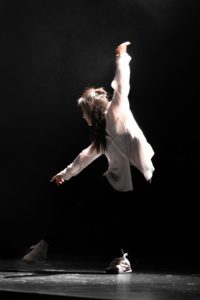
Photo by Leon Liu on Unsplash
To dance in chaos involves letting everything go except the beat. Chaos is about strength, not beauty. It’s about grounding and staying grounded even as the music flings us through space.
Chaos is the part where you dance till you drool.
The edge of chaos is fertile, regenerative, thick with possibility. It’s also powerfully disorganized and unpredictable. It’s exhausting, overwhelming. Too much is happening too fast. When dancing chaos, we give ourselves entirely to the music and follow it through the tumult however we can. As Margaret Shepherd said, “Sometimes your only available transportation is a leap of faith.” Add music to that idea and you have the chaos part of the dance. The car has broken down. The planes are grounded. The train has derailed. The illusion we’re in control has shattered. Our routines and schedules fall apart around us. Our internal and external worlds begin to reshape in ways we can’t understand.
I’ve been troubled in the last couple of weeks by the violence of my rebellion against doing anything except work and play in the garden. I don’t want to write. I don’t want to think or reason. I don’t care about the damn housework. Beltane, May 1st, came and went without my usual ritual and practices. I don’t want to be brave, strong, organized, compassionate, tolerant, empathetic, or responsible.
I can’t remember a time in my life when I’ve shut down like this. I’m unable to guilt or lash myself into being “productive.” I feel ashamed and scared. I don’t recognize myself.
It occurs to me this is my Beltane ritual this year. After all, Beltane is about fertility. Physical fertility, the cyclical fertility of the growing season, creative fertility. My ritual this year is being in the garden. There, with my knees in the dirt, the smell and feel of the soil, the texture of new weeds and old leaves and matted grass (we didn’t have a mower last year), I am peaceful. I know where I am. I am, literally, grounded. I don’t have my phone. Nobody needs anything from me. I bend, kneel, stoop, dig, rake and shovel compost mindlessly. I dream vaguely about new garden beds, rewilding with native shrubs and trees. Black flies come for their drop of blood. The sun shines down on me.
Right now I need to be in the garden. I don’t understand it entirely, but perhaps there’s no need to. What I do know is something in me refuses to engage with anything else. As the lilies and iris emerge, as the tulips bloom and the daffodils fade, as the lilacs bud and the magnolia blossoms fall and cover the ground, I mulch and prune and feel seismic forces beyond my control reshape me internally.

Photo by Kelly Sikkema on Unsplash
So much of what I’ve learned and believed about my family and my place in it has crumbled into dust. Old family myths have exploded with fragments of evidence from Mom’s life, unearthed in the process of selling her estate. I didn’t entirely believe in some of those myths, but they were stable. They provided a family background I was familiar with. I built an identity from the identities family members who came before me created. If I am not the despised one, the broken one, the one who doesn’t belong, the cuckoo in the nest, who am I? Has all that been yet another family myth? Has any of it ever been about who I really am or my personal value, or have I been nothing but a faceless, nameless piece in a dysfunctional family pattern?
I long for freedom. Is this the beginning of freedom?
My recent inability to force myself to take care of business, to be responsible, consistent, and productive, is terrifying. I’ve always pushed myself through any resistance or fatigue. I’ve always known I must justify my existence with constant production, pleasing, and caregiving.
Am I free of that now? If I don’t have to justify my existence because that belief is a lie based on family mythology that’s at least part lies, is that freedom? Am I brave enough to take my freedom, walk away from all the burdens (too heavy for me, but I’ve carried them anyway), and simply choose what makes me happy? I have stood at this crossroad before.
Two weeks ago I wrote about loss. Now I’m watching glimmers of new beginnings, nebulous glints of what might come into the disturbed ground of my being. I pick up trash and find rich soil beneath it. I dig up dandelions and burdocks and discover little patches of old garden. The sun touches me without asking for anything in return. I rake away last year’s debris and mix it with compost to build new garden beds. This morning, the crab apple is in bloom. The tight buds on the white lilac by the porch door gather perfume.
Meanwhile, back in Colorado, strangers live in my mother’s house. Hospice tells me Mom can no longer ambulate independently, even with her walker. A call in the middle of last night reported yet another fall, as she doesn’t realize (or won’t admit) her own weakness. Appraisal revealed my wealthy and powerful grandmother’s gold, pearls, and gemstones were mostly costume, not real. A ladylike façade. A denial of her impoverished roots. A glimpse of shame and fear that rival my own, though I never knew they were there.
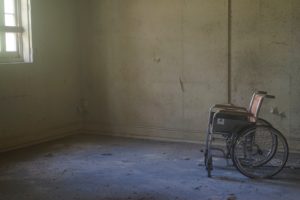
Photo by Doug Maloney on Unsplash
It’s Mother’s Day weekend. A friend asked me yesterday how I felt about that, and I had no words.
What is real? What can I bear? The dirt on my knees, under my fingernails. The spectacularly itchy, burning welts of black fly bites. The egg shells, banana peels, and soggy segments of lemon in the compost pile. The lovely cupped double tulips I planted last fall, white, pink and purple. The thumb-sized bumble bee tumbling ecstatically among the pink blossoms of the crabapple. My own breath, heartbeat, sweat. The sun on my skin.
Gardens are made and remade. They die and are reborn. They go wild and survive until rediscovered. They adjust, adapt, take advantage of the edge of chaos according to their own wisdom and purpose.
For now, I’m in the garden, dancing with chaos, nurturing new life, hanging on.
Questions:
- What is your experience of Mother’s Day?
- In the times during which you struggle to manage your life, are you fearful or do you allow yourself to follow your needs?
- Do you find chaos joyful and exhilarating or frightening?
- What opportunities have you had to reframe your family?
Leave a comment below!
To read my fiction, serially published free every week, go here: 

















